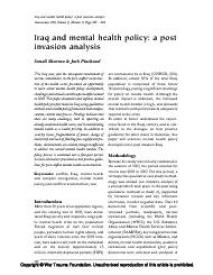Iraq and mental health policy: a post invasion analysis
The Iraq war, and the subsequent involvement of various stakeholders in the post conflict reconstruction of the health sector, presented an opportunity to learn about mental health policy development, challenges and obstacles within a post conflict context in 2003. This paper documents and explores mental health policy in post invasion Iraq, using qualitative methods and a health policyframework that analyses context, content and process. Findings indicate that there are many challenges, both in repairing an already weakened health sector, and in maintaining mental health as a health priority. In addition to security issues, fragmentation of power, change of leadership and lack of funding pose significant problems. Achievements are evident, though insufficient to address the overall mental health burden. The policy process is examined over a four-year period. Lessons learned are presented as best practice guidelines for post conflict mental health reconstruction.
Geachte bezoeker,
De informatie die u nu opvraagt, kan door psychotraumanet niet aan u worden getoond. Dit kan verschillende redenen hebben,
waarvan (bescherming van het) auteursrecht de meeste voorkomende is. Wanneer het mogelijk is om u door te verwijzen naar de bron
van deze informatie, dan ziet u hier onder een link naar die plek.
Als er geen link staat, kunt u contact opnemen met de bibliotheek,
die u verder op weg kan helpen.
Met vriendelijke groet,
Het psychotraumanet-team.
Reference:
Sonali Sharma, Jack Piachaud | 2011
In: Intervention: the international journal of mental health, psychosocial work and counselling in areas of armed conflict, ISSN 1571-8883 | 9 | 3 | 332-344
http://www.interventionjournal.com/sites/default/files/Sharma_2011_Int_Iraq.pdf
In: Intervention: the international journal of mental health, psychosocial work and counselling in areas of armed conflict, ISSN 1571-8883 | 9 | 3 | 332-344
http://www.interventionjournal.com/sites/default/files/Sharma_2011_Int_Iraq.pdf


